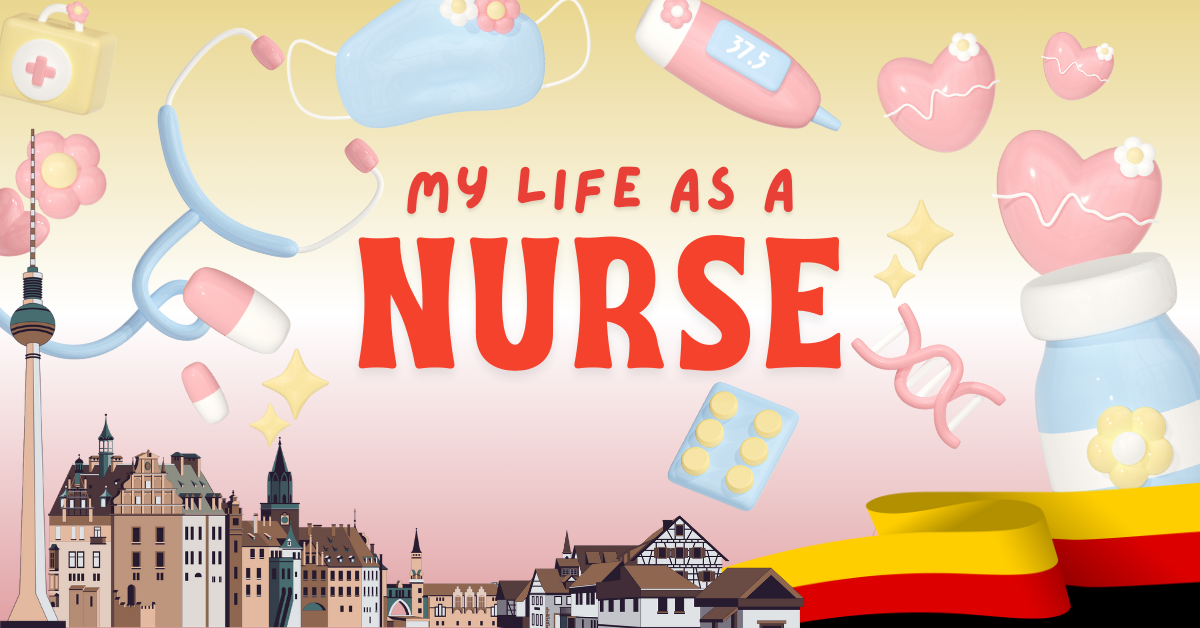🩺 Nurse Life in Germany: Daily Routine & Living Costs During Ausbildung

Estimated reading time: 4 minutes
Ever wondered what nurse life in Germany really looks like during Ausbildung? For many Indian students, it’s the first time living abroad and working hands-on in a hospital. It’s more than just training—it’s a complete shift in lifestyle. This blog gives you an in-depth look at the daily schedule, living costs, transport, insurance, and everything else you’ll handle as a future nurse in Germany.
🎓 Start Preparing for German Early
Mastering the German language is your first step. Many students begin with A1 and A2 levels in India, followed by B1 or B2 before departure.
If you’re just starting out, check out our German A1 course for beginners, tailored to healthcare students preparing for Germany.

What Is Nursing Ausbildung in Germany?
Nursing Ausbildung is a three-year vocational training program combining theory and practical hospital work. You earn a stipend—around €1,150 to €1,350/month (₹1,05,800–₹1,24,200)—while getting hands-on experience in general, geriatric, and pediatric care.
🧑⚕️ Nurse Life in Germany: A Typical Day During Ausbildung
Your routine will vary based on the shift (morning, late, or night) and your current department. Here’s what a typical early shift day looks like:
🔅 Morning Shift (6 AM – 2 PM)
- 05:30 – Wake up, uniform check, breakfast
- 06:00 – Handover with the night team
- 06:30 – Assist with patient hygiene and dressing
- 08:00 – Medication rounds and vitals
- 09:30 – Documentation and support with physiotherapy
- 12:00 – Lunch distribution
- 13:00 – Final patient checks, prep for next shift
- 14:00 – Handover and clock out
You’ll also have theory classes 1–2 times a week, where you study the German healthcare system, ethics, communication, and practice core nursing procedures.
👨⚕️ Common Nursing Tasks as an Azubi
- Monitoring blood pressure, temperature, oxygen
- Assisting with feeding, hygiene, mobility
- Helping nurses with wound dressing and IV setups
- Maintaining documentation in German
- Supporting elderly or emotionally distressed patients
💶 Cost of Living for Nursing Trainees in Germany
Living as an Azubi in Germany requires careful budgeting—especially in cities like Munich or Frankfurt. Here’s what most Indian students spend monthly:
🏠 Rent & Utilities
- Shared apartment (WG): €350–€500
- Dormitory (if provided): €250–€400
→ Avg rent: €450/month (₹41,400)
🍽️ Groceries & Daily Essentials
- Food shopping: €150–€200
- Toiletries, SIM card, internet: €30–€40
→ Avg: €180–€240/month (₹16,500–₹22,000)
🚆 Public Transport: Deutschlandticket
- Monthly unlimited pass: €49 (₹4,500)
- Covers buses, U-Bahn, S-Bahn, and regional trains
- Often subsidized by employers
📍 Anmeldung & Insurance: First Steps After Arrival
✅ Anmeldung (City Registration)
Within 14 days of arrival, you must register your address with the Einwohnermeldeamt.
Required:
- Rental contract
- Passport + visa
- Landlord’s confirmation (Wohnungsgeberbestätigung)
Important: Without Anmeldung, you can’t open a bank account, get health insurance, or receive your salary.
🛡️ Insurances You’ll Need
- Public Health Insurance (GKV) – Usually covered via employer
- €120–€150/month
- Liability Insurance (Haftpflicht) – For accidental damage or injury
- €5–€10/month
- Optional Contents Insurance – For theft or personal belongings
📋 One-Time Setup Costs
| Item | Cost (Est.) |
|---|---|
| SIM card & data | €10–€20 |
| Initial groceries & supplies | €60–€80 |
| Bedding & kitchen tools | €70–€100 |
| Deutschlandticket (if employer doesn’t cover) | €49 |
| Anmeldung support fee (if applicable) | €0–€30 |
🌟 Tips to Adjust to Nurse Life in Germany
- Speak German daily—even small talk helps!
- Carry a notebook to learn new words from senior staff and patients
- Respect hierarchy—address supervisors as Herr/Frau and use Sie form
- Be punctual—arriving 10–15 mins early is expected
- Ask questions—supervisors appreciate curiosity
❓ FAQ: Living and Working During Nursing Ausbildung
Is the Ausbildung program manageable for Indian students?
Yes—with proper German preparation (B1/B2 level), it’s intensive but doable.
How much can I save per month?
You’ll earn €1,150–€1,350/month. After living costs (€700–€800), your savings may range between €300–€500.
Do employers help with rent or insurance?
Some do! Especially hospitals in smaller towns. Always ask during your interview.
Can I switch to a job after Ausbildung?
Yes. Most Azubis are offered permanent contracts immediately after passing their final exams.


